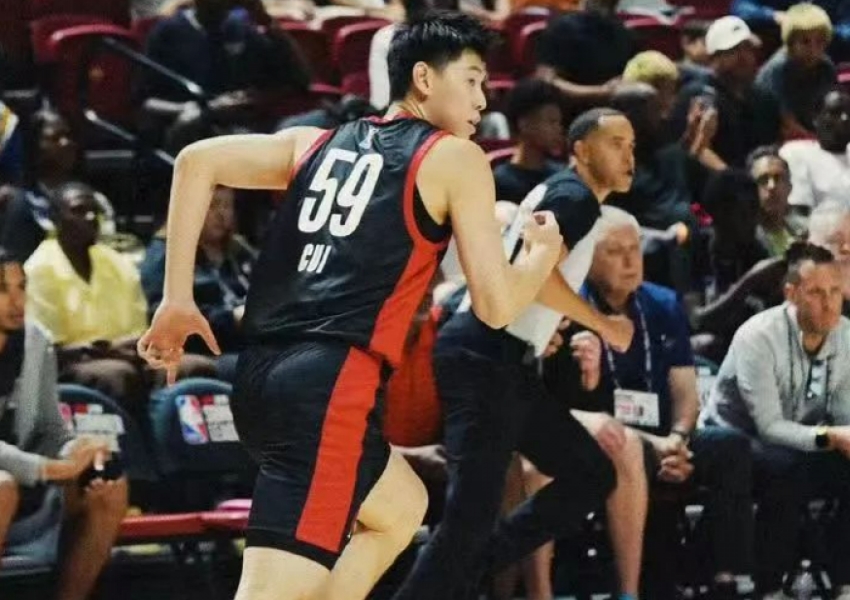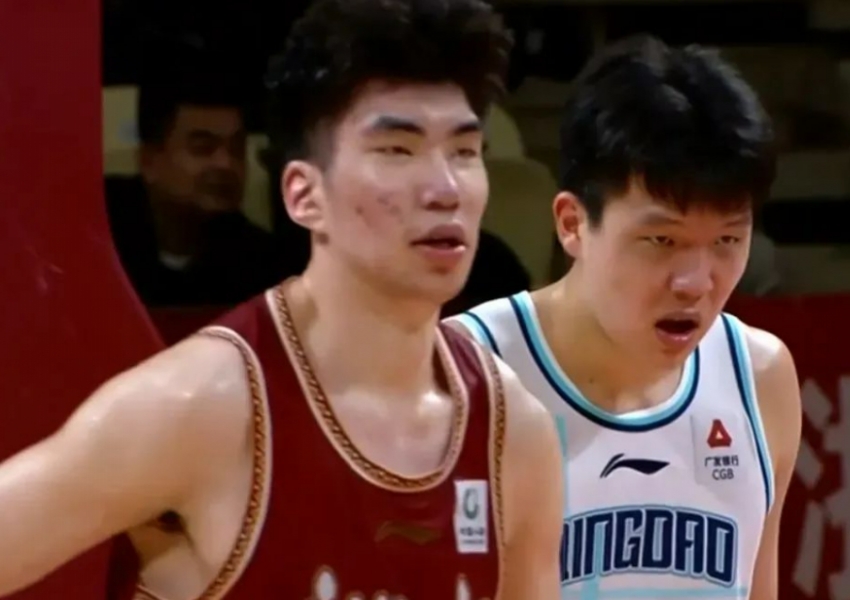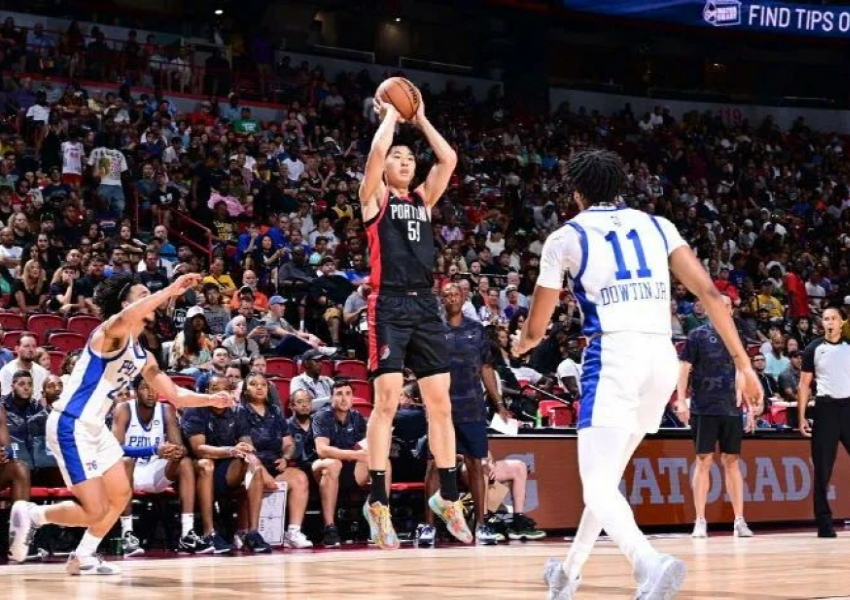Taking a Break! Cui Yongxi Temporarily Exits NBA! China's Top Forward Shows True Grit...
Cui Yongxi, a promising talent from China, has recently returned to his home country. This move is not an abandonment of his NBA aspirations, but rather a necessary step to recuperate from a minor calf strain. After his recovery, Cui plans to return to the U.S. in early August to participate in the Portland Trail Blazers' team training, warm-up games, and preseason camp. During his time in the U.S. this summer, Cui experienced significant physical demands, leading to a strained Achilles tendon even before his calf injury.

Cui's return to China means his NBA Summer League journey has ended prematurely. He played in three games, with his best performance being a six-minute stint where he hit two three-pointers and scored six points along with one assist. Despite these efforts, Cui remained on the fringes of the Summer League roster, with inconsistent playing time and limited opportunities. As a result, he struggled to compete for the Trail Blazers' final two-way contract spot. This outcome was largely anticipated, as transitioning from an Exhibit 10 contract to a two-way contract is a challenging leap.

However, the journey is far from over for Cui. There are still training camps and preseason games ahead, providing him with opportunities to secure a two-way contract, whether with the Trail Blazers or another team. Even if that doesn't materialize, he can continue playing in the G League on his Exhibit 10 contract, maintaining his determination and patience until the NBA door opens. Regardless of the final outcome, Cui's resolute pursuit of his NBA dream this summer has earned widespread recognition.

Chinese basketball is currently in a period of historical low points, requiring more young players like Cui to step up and venture abroad rather than following the crowd. It's not just about going with the flow, but about taking the initiative to leave the domestic league. The CBA (Chinese Basketball Association) is widely regarded as incapable of producing world-class athletes anymore. Cui himself acknowledged this reality when asked why he chose to seek opportunities abroad, stating, "Many people say that playing domestically is like being in a greenhouse; it's true. Playing in China doesn't elevate one's competitive level."
Fortunately, Cui is not alone in this realization. More and more young Chinese players are becoming aware of this issue. Yu Jiahao, after completing his season with the Zhejiang team, quickly traveled to Spain for trials and received interest from multiple clubs. If he signs with a top-tier Spanish team, he might face limited playing time, while a second-tier team could guarantee more minutes but offer less high-level experience. Even though Yu is prepared for the challenges of lower pay, more work, and being far from home, he still needs to negotiate with the Zhejiang team. The club wants him to complete the next season's contract, and they believe that playing in a second-tier Spanish league might not provide more valuable experience than the CBA.
Both Cui and Yu are youth academy players, bound by various restrictions. The same applies to Yang Hansen, who might have entered the 2024 NBA Draft if not for the "interference" from his team, the Qingdao Eagles. This year's draft was considered weak, and Yang would likely have been a first-round pick. We must also understand the CBA clubs' perspective. After years of hard work in developing these players, they are understandably reluctant to let them go without any return on their investment. Many media figures are calling for the league to implement measures that reward clubs with players abroad, fostering a win-win situation for all parties involved.
The challenges Cui faces in transitioning to the NBA highlight the broader issues within Chinese basketball development. Despite the talent and potential, the pathway to the NBA is fraught with obstacles, both physical and systemic. Injuries have played a significant role in Cui's journey so far. The increased training intensity and constant traveling in the U.S. have taken a toll on his body, leading to multiple injuries that require careful management.
Cui's decision to return to China for recovery is a pragmatic one. It underscores the importance of health and well-being in an athlete's career. For a young player aiming to break into the NBA, staying healthy is paramount. His determination to recover and return stronger demonstrates his commitment to his goals.
The NBA Summer League serves as a proving ground for many aspiring players. For Cui, it provided a taste of the competition level and the physical demands of the NBA. Although his performance was modest, the experience gained is invaluable. Competing against high-level talent and adapting to the fast-paced style of play are crucial steps in his development.
Cui's journey is also a testament to the growing recognition among Chinese players of the need to seek opportunities abroad. The domestic league, while competitive, may not offer the same level of development as playing in top international leagues. This awareness is driving more young talents to explore options outside of China, even if it means facing significant challenges.
Yu Jiahao's case further illustrates this trend. His decision to try out for Spanish clubs reflects a broader shift in mindset among Chinese players. They are willing to take risks and step out of their comfort zones to pursue higher levels of competition. This shift is essential for the growth of Chinese basketball on the global stage.
The reluctance of CBA clubs to release their top talents is understandable from a business perspective. Developing a player requires significant investment, and clubs naturally seek a return on that investment. However, striking a balance between the player's career aspirations and the club's interests is crucial. Implementing reward mechanisms for clubs with players abroad could encourage more cooperation and support the overall development of Chinese basketball.
Cui Yongxi's journey is far from over. His determination and resilience are key attributes that will serve him well as he continues to pursue his NBA dream. Whether he secures a two-way contract or continues to develop in the G League, his experiences this summer have already laid a solid foundation for his future. His story is an inspiration to other young Chinese players, illustrating that with hard work and perseverance, breaking into the NBA is a realistic goal.
As the new season approaches, all eyes will be on Cui and his next steps. His ability to overcome setbacks and maintain his focus will be crucial. For now, his temporary exit from the NBA stage is just a pause, not an end. The lessons learned and the experience gained during this period will undoubtedly contribute to his growth as a player. The journey of Cui Yongxi is a beacon of hope for Chinese basketball, signaling a new era of players ready to take on the world.
Copyright Statement:
Author: focusnba
Source: FocusNBA
The copyright of this article belongs to the author. Reproduction is not allowed without permission.
Recommended Blog
- Just 1 Point! Team USA Nearly Upset, Embiid's Bold Comments Backfire!
- 7’0”, 7’5” Wingspan! The Second Overall Pick Already a Bust After Four Games?
- 51-Point Man to Replace George? Lakers Fast-Track Trade! The Ideal Third Option...
- $7 Billion! LeBron James Set to Join the NBA Expansion: Two New Teams in the U.S.
- Trade Finalized! Westbrook Officially Leaves the Clippers: Is This His Last Chance?
- Lakers Eyeing Ayton! 3-for-1 Trade Proposal Unveiled! The Western Conference to Heat Up Again...
- Keep Dismantling! Last Year They Sold Their 3D Guard, This Year Their 3D Center. What’s the Bucks’ Rebuilding Strategy?
- Leave, Klay! Even if It Means a Minimum Salary, Don’t Stay with the Warriors
- From Playoff Fringe to NBA Champions: How Brad Stevens Turned the Celtics into a Contender in Just Three Years
- No Takers! NBA's Biggest "Negative Asset," 29-Year-Old All-Star, 15 Trade Attempts, 15 Failures